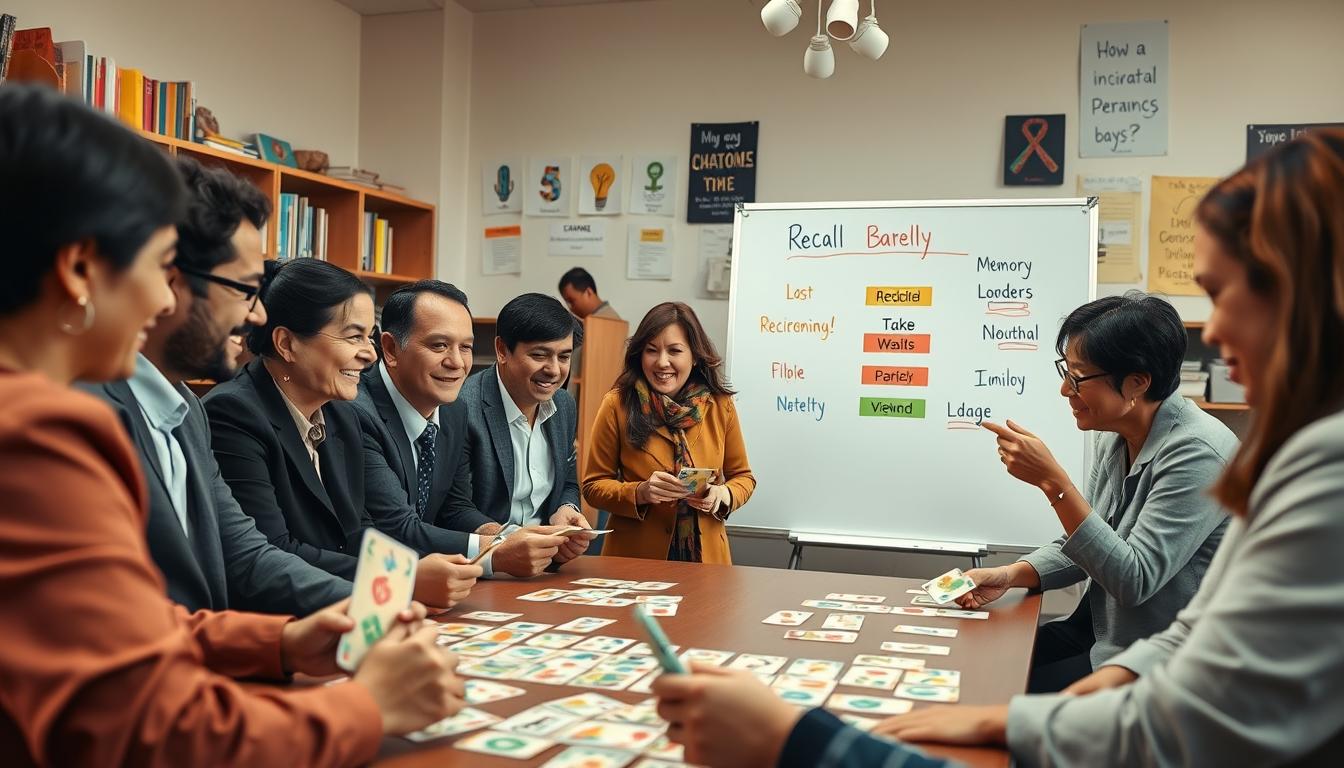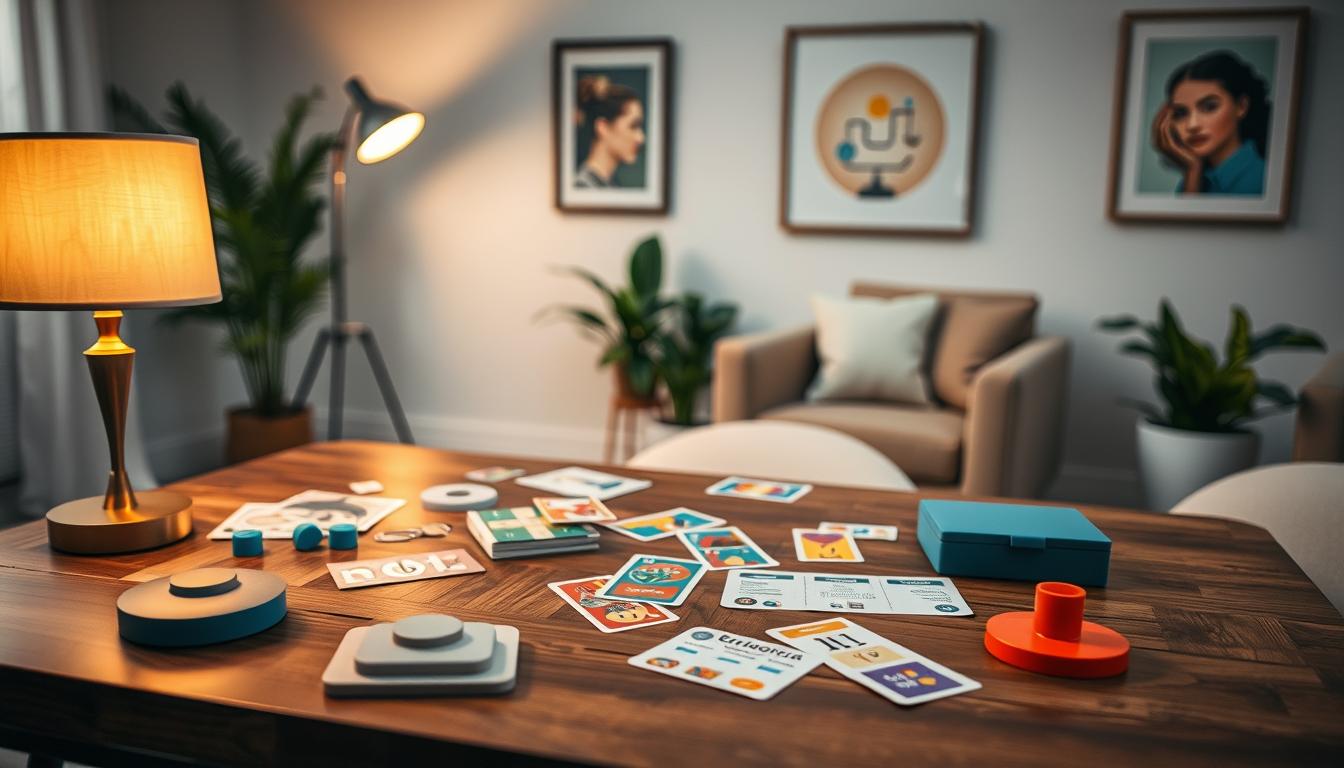Educational games helping adults boost self-confidence and mental focus
Ever thought a game could boost your self-confidence and sharpen your mind? Educational games for adults are becoming key tools for more than just fun. They help improve cognitive function and problem-solving skills. This article will show how adding educational games to your daily routine can be as good for your mind as exercise is for your body.
Understanding the Benefits of Educational Games
Playing educational games has many benefits for our minds. They help improve our thinking skills, focus, and memory. These games also boost our ability to solve problems and think critically.
Playing these games regularly makes our minds more agile and emotionally strong. Adults who play often feel less anxious and depressed. This is great for those who struggle with self-esteem or want to grow personally.
Moreover, educational games can make our brains work better over time. By making games a part of our daily lives, we can keep our minds sharp and improve our thinking abilities.
The Science Behind Brain Training Games
Brain training games boost cognitive function by working on memory, attention, and speed. Regular play helps create new brain connections, making our thinking more flexible. Studies show that regular players get better at visual memory and executive functions.
How Brain Games Improve Cognitive Function
Brain games sharpen mental agility through targeted exercises. They improve attention and memory, key for daily tasks and work. These games challenge users to think critically and adapt fast, enhancing their cognitive abilities.
Neuroplasticity and Mental Agility
Neuroplasticity is crucial for the brain’s ability to change and adapt. It supports lifelong learning and adaptability. By playing brain games, people can boost their neuroplasticity. This leads to better mental agility and improved cognitive skills over time.
Exploring Different Types of Educational Games
Educational games are made in many ways. They help improve thinking, language skills, and memory. Logic games and word games are especially good for these skills.
Logic-based Games and Critical Thinking
Logic games make you think deeply and solve tough problems. Games like Sudoku and math puzzles need you to plan and think ahead. Playing these games often makes you better at solving problems and making decisions.
Word Games for Language and Memory Enhancement
Word games like Scrabble and crosswords help grow your vocabulary and memory. They work the brain’s language areas. Studies show playing word games can improve memory and help with thinking every day.
Educational Games for Adults with Low Self-Esteem
Educational games are a great way for adults with low self-esteem to find success. They offer a safe space to try new things without fear of being judged. This can help build a sense of pride and accomplishment.
These games have clear goals and challenges that help players grow. They encourage people to step out of their comfort zones. This helps build confidence and discover new talents and hobbies.
Many educational games also help people meet others. Working together on tasks can improve teamwork and self-esteem. These experiences can help adults see their true potential and build a stronger sense of self.

Popular Game Options for Mental Focus
Playing engaging games daily can boost your mental focus and brain power. Sudoku and crossword puzzles are two top choices. They offer unique mental challenges that keep you entertained.
Sudoku as a Memory Exercise
Sudoku is great for improving memory and thinking skills. It’s a 9×9 grid filled with numbers, with each row, column, and section needing all numbers from 1 to 9. It’s a fun way to sharpen your mind.
Playing Sudoku regularly helps you remember things better. It makes you think ahead and plan your moves. This game is perfect for anyone wanting to improve their brain.
Crossword Puzzles for Language Skills
Crossword puzzles are a fun way to get better at languages. They test your memory and logic as you fill in words to match clues. Each puzzle you solve makes your brain work harder.
Studies show that doing crossword puzzles regularly can make your vocabulary better. It also boosts your overall brain function.
| Game Type | Focus Area | Cognitive Benefits |
|---|---|---|
| Sudoku | Memory Exercise | Enhances attention and planning skills |
| Crossword Puzzles | Language Skills | Improves vocabulary and logical reasoning |
Research Supporting the Use of Educational Games
Studies show that educational games are great for our brains. They help improve our mental skills. For instance, playing brain games regularly can make us better at focusing and processing information faster.
Playing these games makes our brains more agile. Players get better at solving problems and remembering things. This shows that playing educational games can really boost our mental abilities.
| Study Title | Focus Area | Cognitive Benefits Observed |
|---|---|---|
| Impact of Brain Games on Cognitive Performance | Attention Training | Increased attention span |
| Games for Memory Improvement | Memory Retention | Enhanced recall abilities |
| Longitudinal Effects of Educational Games | Cognitive Agility | Improved processing speed |
More research is showing how effective these games are. They help improve our brain skills. As scientists keep studying, the future looks bright for using games to improve our minds.
Advantages of Playing Brain Training Games
Playing brain games has many benefits for your brain. These games are fun and help improve your mental skills. They make you better at paying attention and processing information quickly, which helps with daily tasks.
Boosting Attention and Processing Speed
Brain games are made to challenge your mind. They help you stay focused longer and work faster. Studies show that players get better at thinking than those who don’t play.
Enhancing Memory Retention
Brain games also boost your memory. They make it easier to remember important stuff. Regular play can keep your mind sharp as you get older.
| Benefit | Description | Impact |
|---|---|---|
| Boosting Attention | Improves concentration during activities | Enhances performance at work and life |
| Processing Speed | Increases speed of information processing | Leads to quicker decision making |
| Memory Retention | Strengthens ability to recall information | Aids in learning and remembering important tasks |
Incorporating Games into Your Daily Routine
Adding educational games to your daily life can boost your brain power. It makes learning fun and engaging. By managing your time well, you can fit in games, even in short breaks or during leisure time.
Finding Time to Play
To make room for educational games in a busy schedule, try these tips:
- Play mobile games on public transport during your commute.
- Use lunch breaks to play games and refresh your mind.
- Choose specific times each day, like mornings or evenings, for gaming.
Tips for Staying Consistent
Being consistent is key to getting the most from educational games. Here are ways to make gaming a regular habit:
- Use phone reminders to keep your gaming schedule on track.
- Log your progress in a journal or app to celebrate your wins.
- Have a variety of games ready to keep things interesting and motivating.
Selecting the Right Educational Game for You
Choosing the right educational game can really help you grow and improve your thinking. It’s important to know what kind of games you like best. Each game has its own special benefits for different ways of learning.
Think about what you need from a game. Some games test your problem-solving skills. Others help with words and creativity. Some platforms even help you find games that fit your learning style.
Here’s a quick guide to help you pick the right game:
| Game Type | Primary Focus | Cognitive Preference |
|---|---|---|
| Logic Games | Critical Thinking | Analytical Thinkers |
| Memory Games | Memory Retention | Visual Learners |
| Word Games | Language Skills | Creative Minds |
| Puzzle Games | Problem-Solving | Strategic Thinkers |
Choosing a game that matches your learning style makes learning fun and keeps you interested. With so many games out there, finding the right one for you can lead to great growth and learning.
Apps and Online Platforms for Brain Training
Brain training apps have become very popular. They help improve our thinking skills. Lumosity and Elevate are two examples. They offer fun games that test different mental abilities.
These apps have activities that challenge users. They also track how well you’re doing. This helps you see how you’re improving over time.
Highlights of Popular Apps Like Lumosity and Elevate
Lumosity is a top brain training app. It has games that improve memory, attention, and problem-solving. It offers training plans based on how well you do, making it personal.
Elevate focuses on skills like communication and math. It makes learning fun and interactive. Both apps use games to make learning enjoyable and help improve your brain.
Accessibility Features on Gaming Platforms
Many game platforms now have features for everyone. These features help people with different abilities use brain training apps. They include customizable settings, voice commands, and adaptive technologies.
This makes learning more accessible to everyone. It creates a welcoming space for all to improve their thinking skills.

Long-term Benefits of Engaging with Educational Games
Playing educational games has many long-term benefits. It sharpens your mind and makes you more adaptable and resilient. Spending time on these games can make you mentally quicker and improve your brain health over time.
Studies show that playing these games can boost your problem-solving skills and critical thinking. They make you think outside the box and plan ahead. This keeps your brain sharp as you get older, helping you stay mentally sharp.
These games also help you learn new things and stay mentally flexible. They’re not just fun; they help you grow and improve your brain. This makes them a great tool for keeping your mind active and healthy.
| Benefit | Description |
|---|---|
| Mental Agility | Improves reaction time and decision-making abilities through complex problem-solving tasks. |
| Resilience | Encourages adaptability to new challenges, fostering a growth mindset. |
| Cognitive Longevity | Promotes long-term brain health and reduces the risk of cognitive decline with age. |
| Critical Thinking | Enhances the ability to analyze information and develop reasoned conclusions. |
Balancing Gaming with Other Brain-Boosting Activities
Playing educational games has many benefits for the brain. But, mixing gaming with other activities is even better for brain health. Adding physical exercise and social interactions can make these benefits even stronger.
Physical Exercise and Mental Health
Exercise is great for the brain. It boosts blood flow and makes more brain cells grow. This leads to better thinking skills. It also helps with anxiety and depression, making you feel better mentally.
Playing games and exercising together is a smart way to improve your brain. It’s a balanced approach to getting smarter.
The Role of Social Interactions in Cognitive Function
Being social is good for your brain. Playing games with others helps you solve problems together. It makes learning fun and boosts your brainpower.
Having strong social connections adds to the benefits of educational games. It’s key for keeping your brain healthy and sharp.
Overcoming Limitations of Brain Training Games
It’s key to know the limits of brain training games for better cognitive training. Not playing regularly can mean less than ideal results. Playing often, like exercising, brings big benefits. Sticking to a daily routine helps beat common challenges in improving brain skills.
Understanding the Need for Consistency
Being consistent is crucial for the best brain training from games. Without regular play, gains might seem small or short-lived. A set schedule keeps the brain growing, just like exercise keeps the body fit.
Realistic Expectations from Brain Games
It’s important to have realistic hopes for brain game improvements. Some skills might improve a lot, but not all. Focusing on specific areas, like memory or problem-solving, can be more effective. Knowing the limits helps us see the real value of brain training.
| Expectation | Reality |
|---|---|
| Swift, all-encompassing cognitive improvement | Gradual enhancement in selected skills |
| Instant mastery of new tasks | Continued practice needed for mastery |
| Brain training guarantees real-world success | Cognitive benefits may vary by context |
| Improvement in all cognitive domains | Specific skills may improve more than others |
Conclusion
Exploring educational games shows their many benefits, especially for adults wanting to feel more confident and focused. These games help improve skills like solving problems, remembering words, and thinking critically. They are not just fun; they are powerful tools for improving our minds.
Playing these games every day can make you smarter and more confident. They help grow your mind and keep it healthy. Using educational games is a great way to become more confident and sharp.
When you look at all the games out there, try to make them a part of your daily routine. Doing so can greatly improve your focus and mental health. This way, the benefits of these games will last long after you play them.
FAQ
What are the main benefits of educational games for adults?
Adults can improve their thinking skills and memory with educational games. They also help focus and boost confidence. These games make the mind more agile and can lower stress and depression.
How do brain training games stimulate cognitive function?
Brain training games work on the brain’s mental areas. This leads to better attention, memory, and speed. Regular play makes the brain more flexible and adaptable.
What types of games are effective for boosting critical thinking?
Games like Sudoku and math puzzles are great for critical thinking. They help solve problems and improve analytical skills.
How do word games benefit language skills?
Word games like crosswords and Scrabble improve vocabulary and memory. They work different brain parts, enhancing language skills and memory.
Can adults with low self-esteem benefit from educational games?
Yes, educational games help adults feel more confident. They offer challenges and goals that help grow self-esteem.
How often should I play brain training games to see results?
Playing brain games every day is key for better thinking. Studies show daily play improves attention, memory, and brain agility.
What are some popular brain training apps available?
Apps like Lumosity and Elevate are popular for brain training. They track progress and offer games tailored to your skills.
Are there accessibility features in brain training platforms?
Yes, many platforms now have features for all abilities. This makes brain training games more inclusive for everyone.
How can educational games contribute to long-term cognitive health?
Playing educational games regularly keeps the mind sharp and adaptable. This can help maintain cognitive health as we age.
Why is physical exercise important in conjunction with brain games?
Exercise improves mental health and thinking skills. Combining it with brain games boosts the benefits of educational games.














